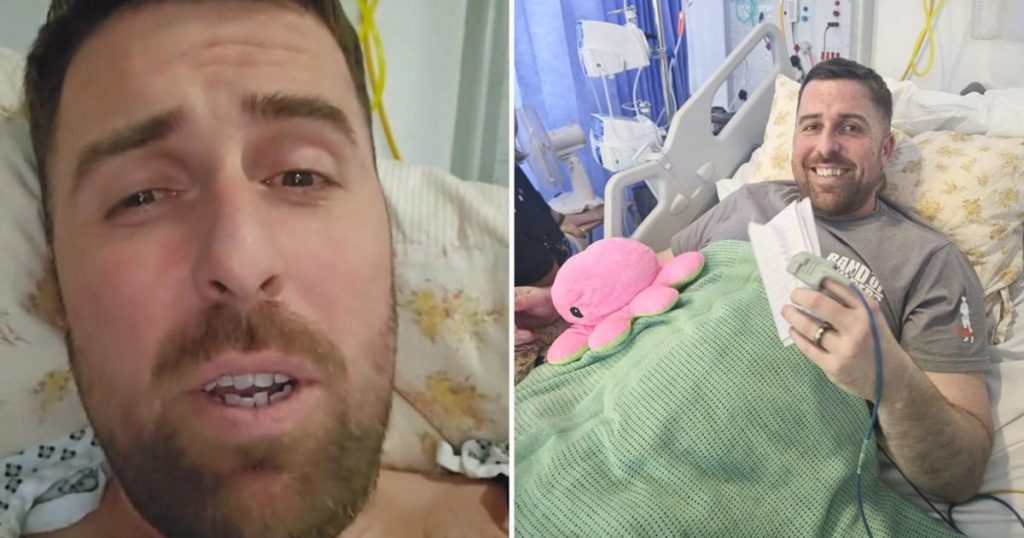A Seemingly Minor Earache Masks a Life-Threatening Brain Hemorrhage: Adam Tradie’s Harrowing Journey
Adam Tradie, a 36-year-old father of five from Swansea, experienced a health scare that underscored the importance of persistent medical advocacy and the deceptive nature of seemingly minor symptoms. What initially presented as a persistent earache and headache, ultimately revealed itself to be a subarachnoid hemorrhage, a potentially fatal condition involving bleeding on the surface of the brain. This near-death experience serves as a stark reminder that seemingly insignificant ailments can sometimes mask serious underlying medical issues.
Adam’s ordeal began with a two-week bout of ear pain and headaches. Initially dismissing it as a simple ear infection, he sought relief through microsuction, a procedure designed to clear blockages. However, the pain intensified, unyielding to antibiotics and raising concerns for his wife, Katie. Her insistence on seeking emergency medical attention proved to be a life-saving decision.
Upon arrival at the hospital, Adam’s condition rapidly deteriorated. His face began to droop on one side, a classic symptom of a neurological event. The rapid decline necessitated immediate medical intervention, with Katie alerting hospital staff to his worsening state. He was subsequently diagnosed with a subarachnoid hemorrhage, a type of stroke requiring urgent medical care. The diagnosis was a chilling echo of his mother’s untimely death from a brain aneurysm at the age of 42, intensifying his fear and anxiety.
The subarachnoid hemorrhage, an uncommon type of stroke, is characterized by bleeding in the space between the brain and the surrounding membrane. This bleeding can lead to a sudden, severe headache, often described as the “worst headache of my life.” Other symptoms can include nausea, vomiting, stiff neck, sensitivity to light, and changes in mental status, such as confusion or seizures. Prompt diagnosis and treatment are crucial to minimize the risk of long-term complications or death.
Adam’s case highlights the critical role of persistent advocacy in medical situations. Had Katie not insisted on seeking emergency care, the outcome could have been drastically different. His initial self-diagnosis and the seemingly innocuous nature of his early symptoms could have easily led to a delay in receiving appropriate medical attention, potentially resulting in irreversible brain damage or even death.
The experience left Adam deeply grateful for his wife’s persistence and the timely intervention of medical professionals. It also instilled in him a profound appreciation for the fragility of life and the importance of heeding even seemingly minor health concerns. His story serves as a powerful reminder to listen to our bodies and seek professional medical advice when symptoms persist or worsen, rather than dismissing them as trivial.
Adam’s recovery continues, marked by ongoing medical care and the uncertainty of the future. He faces a period of medication, monitoring, and further assessment to determine the best course of action. While the road ahead remains unclear, he is determined to share his experience in the hope of raising awareness and encouraging others to seek timely medical attention. His story emphasizes the importance of advocating for one’s own health and never dismissing seemingly minor symptoms without proper medical evaluation.
This incident underscores the critical role of family and friends in supporting loved ones through medical crises. Katie’s unwavering support and insistence on seeking emergency care undoubtedly saved Adam’s life. It highlights the importance of speaking up for ourselves and our loved ones when we sense something is not right, even if initial symptoms seem minor or manageable.
Adam’s story also serves as a poignant reminder of the impact of family history on health. His mother’s untimely death from a brain aneurysm heightened his anxiety and underscored the potential seriousness of his own neurological event. Understanding family medical history can play a crucial role in identifying potential risks and seeking preventative care.
The incident further emphasizes the unpredictable nature of health crises. What began as a seemingly minor earache rapidly escalated into a life-threatening condition, demonstrating how quickly health can deteriorate and the importance of prompt medical attention. It underscores the need to be vigilant about our health and seek professional guidance when faced with persistent or worsening symptoms.
Adam’s ongoing recovery and his decision to share his story serve as an inspiration to others. His experience highlights the importance of early intervention, persistent advocacy, and the vital role of family support in navigating medical crises. It’s a story of resilience, hope, and the importance of never giving up, even in the face of adversity.
Finally, Adam’s story serves as a powerful call to action. He urges anyone experiencing similar symptoms to seek immediate medical attention and to persist in their pursuit of answers. He emphasizes the importance of not being dismissed or fobbed off by medical professionals and to advocate for oneself until a proper diagnosis and treatment plan are in place. His message is clear: never underestimate the potential seriousness of seemingly minor symptoms, and always prioritize your health and well-being.











